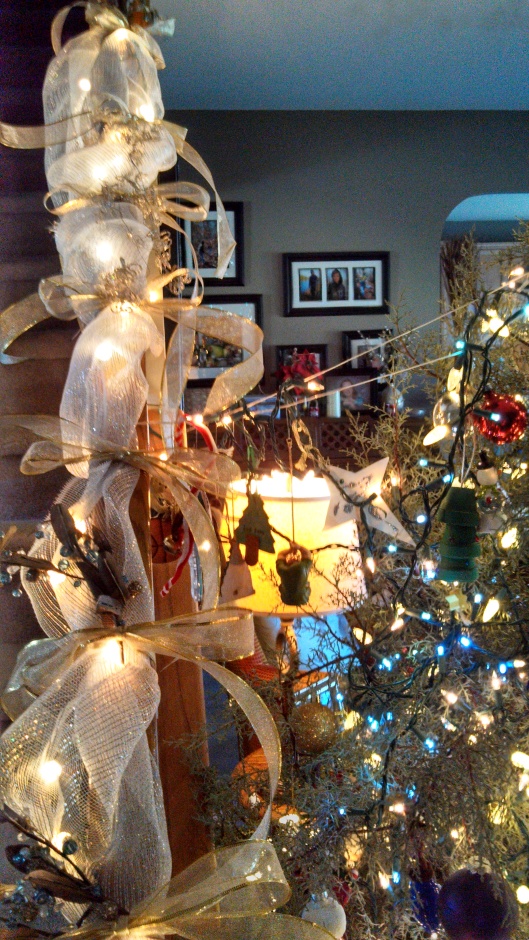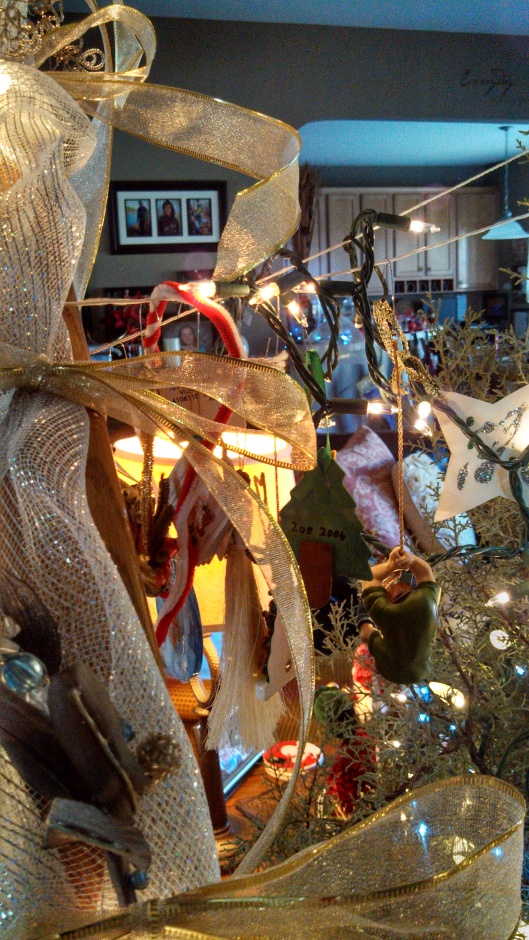wrap it with Light
 Early morning and Lights twinkle, the Advent candles burn their persistant hope, and in the kitchen I stand still, watching my daughter pause over her pricked finger and the blood rounding into a bubble at the tip. I know she’s crying by the way she catches her breath, the slope of her back, the angle of her head. I stop still, forgetting my whirling and the checklist in my head, forgetting the dirty dish in my hand and the water running over it.
Early morning and Lights twinkle, the Advent candles burn their persistant hope, and in the kitchen I stand still, watching my daughter pause over her pricked finger and the blood rounding into a bubble at the tip. I know she’s crying by the way she catches her breath, the slope of her back, the angle of her head. I stop still, forgetting my whirling and the checklist in my head, forgetting the dirty dish in my hand and the water running over it.
“Zoe, what’s wrong?”
I turn off the faucet and leave the dish grimy by the sink, walking over to where she sits at the table. She bites her lip, tucking her eyes in shadow, and I can tell she’s trying to see through the blur to collect the blood onto the test strip in front of her. The screen on her glucose meter blinks to life, recognizing the delivery of a sample, and she looks up at me, letting me see her red eyes and the skin around them blotched with pain. She lifts a finger, signaling that I should wait until she can speak. She swallows, blinking back tears, but her words will only come out in a whisper before her eyes fill and she loses them all over again. She gestures to the meter, laying open on the table.
“It’s this…I hate it.”
Her words ache in the heart of me, and I drop into a chair next to her.
“I know. It stinks. But when I look at you, I see a beautiful girl—smart, strong, and so talented…Diabetes doesn’t change any of that.”
A tiny chuckle escapes her lips on the front end a wail, and she sighs, wiping her eyes with her fingers, gasping under the weight she carries, the burden sitting heavy over her heart. “It’s just…I don’t want everyone to know about it. I don’t know how to tell them about it.” Her voice escapes faintly, an exhale. I know by everyone, she means her peers, especially. At her age, little girls practice drama and friendship and comparison and style, testing and tasting it all for merit and self discovery. At her age, diabetes skews everything crooked.
“That’s a hard thing.” I acknowledge it quietly, thinking about how long it has taken God to teach me to be faithful in transparency, how He still tugs at whatever I’m using to cover over my own vulnerability, how I still want to cloak my imperfections so that I will look more worthy of admiration. Word says His strength is made perfect in my weakness, that His grace is sufficient (2 Corinthians 12:9), but sometimes I just can’t get past how it all looks to everyone else. Do they really see the glint of Him, appraising all my crooked and messy and awkward? Faith acknowledges the fact that He uses our weaknesses, or rather the appearance of His strength in the face of them, for brilliant Glory. But the truth is that I want to be David while looking like Eliab (1 Samuel 16:6,7), and that’s the sin that twists and tangles and distorts my perspective. The LORD does not look at the things people look at. People look at the outward appearance, but the LORD looks at the heart. Yes. My God is the God who brings Kings out of stables and mangers and out of the pasture with the sheep, who sculpts Glory out of swindlers, prostitutes, and unwed mothers. My God is the God who redeemed a man who persecuted and murdered Christians and made Him a teacher willing to lose everything in order to preach Christ. My God is the God who chose uneducated fishermen as disciples for the King of Kings. My God is the God whose hands lift the poor, the imprisoned, the childless, the lonely, the broken, the outcast, the lame, and offer them a permanent place at His table. My God is the God who is unashamed to call himself the God of any broken, twisted person who will own their own sin, their need of Him, their inadequacy, their weakness, their bent and crooked places.
I’m thinking this, touching the strong line of it, the etching of His fingers upon me, wondering how to tell my daughter this same difficult thing. “You know, I used to hate to tell everyone that I have two children with Autism. It made me feel so lonely in it and so different—all the explaining. I so wished I could just experience motherhood the way most other mothers do. It took me a long time to be able to see it rightly. For a while, all I could see was the mess of it.” I stand up, walking back into the kitchen, reaching into my memory.
And from the kitchen, I can see our Christmas tree and the string Kevin tied to the stairs to straighten it at the top. I had touched the needles of that tree with my fingers, testing for prickles, admiring the blue tint, thinking that the texture reminded me of seaweed. I had admired that tree up close, held it in my hands, and Kevin had inspected the trunk for us at the bottom, declaring it straight. We had all agreed that it was our tree–a beautiful, fitting, perfect tree. But when we got the tree home and put it in the stand, we quickly discovered that through the middle, the trunk had grown at an angle. We stood back and looked, and all we could see of it was the leaning. “It’s definitely not straight,” Zoe had said, again and again, and I had just sighed, thinking, I can’t have a bent tree. So Kevin tied a string around the errant trunk, pulling it closer to the stairs, just so it wouldn’t be top-heavy.
I can’t have a bent tree. So, I will give it what it needs to stand.
From the kitchen, I look at our crooked tree tied at the top with a string, and I feel God pressing His fingers right into me, holding me strong, helping me stand.
When Kevin had finished tying strength into the top of that tree, I sighed and said, “I think I can hide that.” The string, the proof of crooked and bent and imperfect, seemed like a blight on my vision of beautiful. I wanted the tree to look straight without the help we gave it drawing any attention. I wanted our wild, ruddy David to look like a princely Eliab.
But Kevin smiled at me and said, “Oh no. We can’t hide it. The string is what makes it great. I think we need to wrap that string with lights and hang ornaments all over it.”
And so, we did. We decorated that string with baubles and memories, with our laughter and love. It shines awkward in the twinkling, but it is the distinguishing thing we will remember long after the holiday has been packed away, and so it has become a treasure, a humble gift, like all the True gifts of Christmas.
I stand in the kitchen, smiling at that tree and its crazy string–the only thing holding it straight, and that’s when the Spirit marks me deep, giving me a gift I can share with my daughter. Something she can See. Because the truth is that God chooses the messy and the crooked, the bent and the broken, the struggling and the leaning and the weak and the imperfect, because His Power and Grace and Love will be the only thing that can hold them straight. He will be our distinguishing and lasting beauty, the rare mark on us remembered after our temporary journey here is packed away for eternity. That we need Him, that we desperately depend, that without Him we would surely fall, that’s the awkward in us shining with His Glory. That’s where He’s so clearly seen.
My God—my Beloved, Cherished, Faithful, All-Powerful Father– touched a bent and crooked tree, an evil-warped Cross, and it became the symbol of Grace. His hands, bloody nailed to that wood, were the ugly that became its stunning beauty. He died so that we would know that eternal life only comes by His hands holding us. Without Him, we’re all just bent trees—crooked right through the middle, top heavy and destined to fall.
I walk back over to Zoe and gesture toward our Christmas tree. “You know, we’re all just bent trees—leaning, awkward, crooked trees—and God is the shining strength holding us straight. Diabetes is just a place where your trunk is bent. To hide it would be to deny that God holds you up. No, no. A uniquely beautiful thing such as that should not be hidden. It needs to be wrapped with lights.”
At this she smiles, leaning into me, and I gather in with my arms. “Sweetie, God isn’t glorified through what we’re living unless we’re willing to own it and talk about it. I know it’s hard for you—especially right now. It’s okay to say, ‘I hate this,’ and it’s okay to cry, and it’s okay to admit that sometimes it all just feels crushing hard. But you have to learn to see diabetes as your great opportunity to bring glory to God, as the place where God’s hands can be seen holding you. You get to tell people that God is the Strength that keeps you from falling under it.”
So this is the splendid truth I see now every time I look at that string holding up the top of my Christmas tree: We don’t need to hide the fact that we can’t stand up straight on our own. We need to string those places with lights and decorate them with ornaments—the precious gifts of His grace—so that everyone can clearly see the Hands of God holding us. Because those crazy places are the spots God makes most beautiful, the places where He will still be remembered long after we’re gone.





